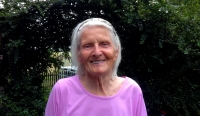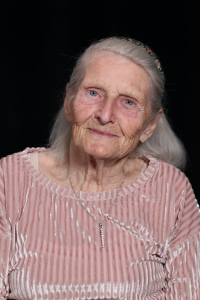Dad, I’m sending you a million kisses

Download image
Věra Albrechtová, née Havlová, was born on August 27, 1932 in Německý (Havlíčkov) Brod. They lived in Dolní Street in the District House and from the age of six she became a member of the scout unit. During the Second World War, her father Čeněk Havel was one of the main organizers of the anti-Nazi resistance within the Defense of the Nation group in the Vysočina region. He was arrested in March 1940 and subsequently attempted an unsuccessful escape from prison. He was sentenced to death in Germany in February 1943 and executed on 24 May in the Plötzensee prison in Berlin. His wife, along with her children Věra and Ivan, moved to her aunt in the countryside in Liban near Nasavrky, from where they returned in May 1945. The witness subsequently witnessed the public execution of the Germans, which took place immediately after the People’s Court ruling at the Old Town Hall in Německý Brod. . After the war, she returned to Junák’s renewed activities and successfully passed the Three Eagle Feathers camp test. She played competitive ball games and graduated from the Havlíčkův Brod grammar school. In the first half of the 1950s, she accompanied a friend to visit an acquaintance who was serving a sentence in a uranium camp in Jáchymov. Josef Albrecht, a fellow prisoner of the acquaintance, developed romantic feelings for Vera. After three years of correspondence, she came to visit him, and after his release on amnesty, they married in the autumn of 1961. In the spring of 1967, the Albrechts embarked on an adventurous journey to the Middle East. The witness worked in the Plastimat company, from where she was fired after 1968 as part of a nationwide reduction in the number of administrative employees. After the fall of the communist regime in 1989, she returned to scouting for the third time and is still a honorary member. She lived in Havlíčkův Brod at the time of filming (June 2020).


















